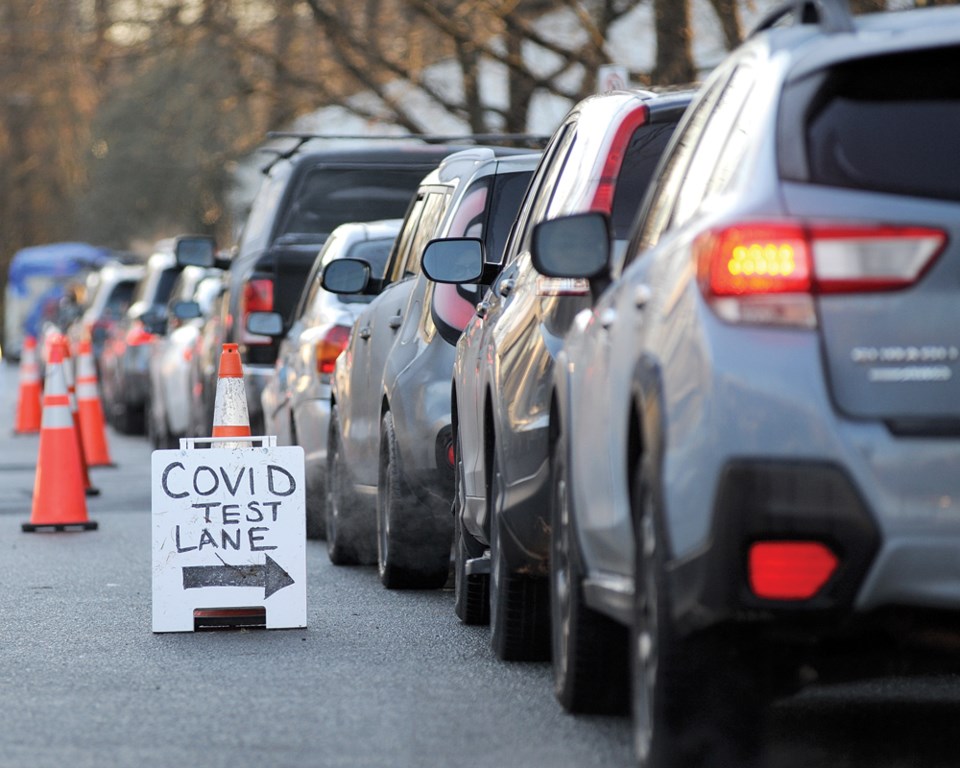The record rise in COVID-19 cases due to the Omicron variant will put “extreme” demand on B.C. hospitals in January, according to the latest predictions from an independent modelling group.
The BC COVID-19 Modelling Group is made up of 13 experts in infectious disease, mathematics and data — many from the province’s top-tier universities like UBC, SFU and UVic.
Their latest analysis, which hasn’t been peer-reviewed, notes the Vancouver Coastal Health and Fraser Health regions have experienced the greatest surge in cases in recent weeks. And that’s only expected to get worse.
“Cases are expected to exceed 1 in 1,000 in the coming weeks if transmission is not substantially reduced,” noted the report, pointing to the rise in cases in Vancouver Coastal Health.
On Wednesday, cases surged to 1,474 across B.C., their highest one-day total since the beginning of the pandemic.
The modelling group says the growth rate of Omicron cases is estimated to be between 23 and 29 per cent per day. At that rate of transmission, cases would double roughly every three days.
More data is needed to estimate how Omicron is growing in the province’s Northern Health, Interior Health or Island Health regions, according to the report.
Working with limited data, some early reports around the world have indicated the Omicron variant provokes fewer severe health outcomes than the Delta variant. But the BC COVID-19 Modelling Group says that severity remains uncertain.
They model three scenarios looking at how Omicron will impact the health-care system: one if Omicron is 30 per cent as severe as Delta, another if it’s 50 per cent as severe, and in a third scenario, where there’s no difference in health outcomes between Delta and Omicron.
In all cases, hospital capacity is overwhelmed by January, climbing from 187 hospitalizations on Dec. 22 to between 600 and well over 1,600 admissions.
Beyond January, the model starts to fall apart. That’s because it’s hard to predict the effects of new public health measures and the way the public behaves in the face of the current Omicron wave.
Public health measures have worked in the past, but they’ve never been tested against such a virulent strain of the SAR-CoV-2 virus.
Another big unknown is how much of B.C.’s population had immunity to Omicron when it arrived, and how the immunity of those who have recovered from the variant will affect transmission.
The researchers add that tracking the rise of the Omicron variant will be challenged by a data blackout over the holidays. The increasing popularity of self-administered rapid antigen testing — 11 million of which have been requested by the B.C. government — will make logging cases difficult, notes the report.
Whatever the case, the models agree on one thing, “B.C. is facing an Omicron tidal wave.”
“Regardless of the value of the unknown parameters, we expect [the] number of people in hospital to exceed that previously seen in the pandemic by mid-January,” write the researchers.
What’s needed, says the independent group of scientists, is to buy more time for booster vaccinations, which according to preliminary data, have proven to reduce severe Omicron infection.
Hypothetically, they say, if every vaccinated British Columbian received a booster, the doubling time for Omicron cases would go up to 6.6 days and peak hospital demand would be reduced by a factor of 160.
On Tuesday, provincial health officer Dr. Bonnie Henry said the province is accelerating its booster rollout, but not until the new year.
Some health authorities are working to set up mass vaccination clinics after the holidays. Other provinces are already giving out boosters in large numbers, including Alberta, which announced anyone 18 and over is now eligible.
With files from Castanet




